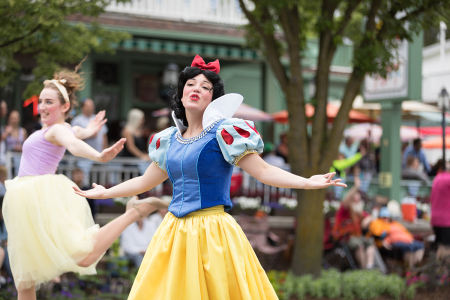Star of Disney's new 'Snow White' misunderstands symbolism, meaning of original tale, author says

The star of Disney's "Snow White" remake has ignited a debate following her comments about the original film, implying that the prince is a "stalker" and the lead character lacks bravery.
Disney's original "Snow White" film, based on the classic fairy tale, premiered in December 1937, and the remake is slated for a March 2024 release. Many recent headlines about the film center around its lead actress, Rachel Zegler, the 22-year-old cast to play the beloved character Snow White.
"I mean, you know, the original cartoon came out in 1937 and very evidently so," Zegler told Extra in a 2022 interview. "There's a big focus on her love story with a guy who literally stalks her. Weird! Weird. We didn't do that this time."
In a September interview with Variety, the actress reiterated that the modern remake of "Snow White" would deviate from the original film and offer a different interpretation of the iconic Disney princess, one that does not have to be saved by a prince.
"And she's not going to be dreaming about true love," Zegler stressed. "She's dreaming about becoming the leader she knows she can be, and the leader that her late father told her that she could be if she was fearless, fair, brave and true."
Faith Moore, author of Saving Cinderella: What Feminists Get Wrong about Disney Princesses and How to Set It Right, and the upcoming novel, Christmas Karol, contends that Zegler and modern audiences have misunderstood how fairy tales use symbolism to tell a story.
"Fairy tales rely on what mythographer Marina Warner calls 'a symbolic Esperanto' — a series of elements that are the same from story to story and always represent the same thing," Moore told The Christian Post.
As the author explained, the appearances of fairy tale characters are a reflection of their inner selves, with outer beauty representing inherent goodness. Other symbols in fairy tales include forests, which symbolize mental turmoil, and mirrors, which serve as a reflection of the true self.
"The trope of love at first sight and true love's kiss — which is what Zegler is taking issue with here — falls squarely within that symbolic shorthand," Moore told CP. "But we, as a culture, have forgotten this about fairy tales and are intent on taking them literally."
"So, the reason Zegler — and lots of other people — think Snow White's prince is 'a stalker' is because they don't know that fairy tales are not meant to be taken literally and, even if they knew they were symbolic, they don't know what each element symbolizes," the author added.
In the first chapter of her book, Saving Cinderella, Moore expands upon the character of the prince and the meaning behind the kiss he bestows upon Snow White after she falls into a deep sleep. According to the author, the kiss symbolizes Snow White's completed transition into a woman who is ready to experience mature, romantic love.
"I think the story is about a girl's transition from childhood to womanhood," Moore explained. "It begins with the older woman realizing she's been replaced and ends with the girl entering into the fullness of her womanhood."
The "older woman" refers to Snow White's stepmother, the evil queen who seeks to kill Snow White after The Magic Mirror declares that the young princess is the "fairest of them all." Snow White is forced to flee, stumbling through a dark forest before finding herself at the house of the seven dwarves.
Citing the original tale the Disney film is based on, Moore said the comb and laces represent the "transition to menarche and sexuality and childbearing." While the Disney film depicts Snow White eating the poisoned apple from the wicked queen disguised as a beggar, the princess nearly dies via a poisoned comb and laces that are tied so tightly, she can barely breathe.
The kiss, Moore stressed, is necessary to the story because it represents Snow White's new womanhood status. She also noted that the alternative to the prince kissing Snow White to awaken her would have been just to leave her asleep.
"The prince is hardly a character at all; he's a symbol," the author said. "A symbol of Snow White's new power — the ability to procreate. It's actually a really feminist story."
Regarding Zegler's comments about how the latest version of Snow White is a "leader" who is "brave," Moore pointed out that the Disney princess already has many of the traits Zegler believes Snow White lacks.
"She is brave, resourceful and true to herself," the Saving Cinderella author said. "She finds herself lost and alone in the house of seven strangers and decides to strike a bargain: I cook and clean, you keep me safe. That's resourceful! She whistles a happy tune to lift her spirits. That's brave!"
"When writers create female heroines that embody traditionally masculine traits — like prowess in battle, risk-taking, disinterest in family life, etc. — they are essentially saying that the only way to be a powerful woman is to be a man," she added. "Which is horribly minimizing to women."
Once again, Moore emphasized that audiences aren't meant to interpret fairy tales literally, adding that Snow White's status as a leader is irrelevant symbolically, as the story is about her transition from childhood to womanhood.
When asked to envision a hypothetical, where she was writing the script for the new "Snow White" movie, Moore said she'd allow the title character to be "unapologetically feminine" and highlight the things that make her "powerful."
"Her ability to take care of a home and cook and clean are important and valuable skills," Moore said. "Her nurturing nature and selfless care are beautiful things. The love she shares with the prince implies the greatest gift and strength of all: that she will one day be a mother and raise the next generation of children to be clear-eyed, brave and true."





















